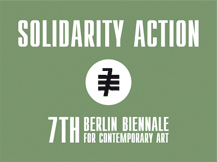1 I am not sure if art can generate democratic processes in undemocratic societies, but it can help in initiating debates on socially pertinent issues.
2 About 30% of the total budget of Kunsthalle Basel that I run is spent on production of exhibitions, events and publications. Almost 50% is spent on personnel and the rest on infrastructure. I think it is difficult to say that the money spent on salaries is not invested in the program. It is the people who make institutions, and they should be paid fair salaries.
3 I do not believe in alternative funds to support real production. Art must be seen in relation to a larger economy. I think co-operative enterprises and artist-run spaces can help artists to distribute their work (for example film and video) and perhaps also co-finance production of new work.
4/8 We should imagine and insist on implementing such models. Cultural production should be returned to producers and taken away from the hands of politicians and clerks. While art, as ever, continues to serve political representation as a decoration or satisfies the conservative taste, reduced to one of luxury goods or creative businesses, we should imagine models, in which art takes a role of cognitive, discursive-aesthetic tool.
5 I am not that familiar with the situation in Italy, but certainly the funding cuts for institutions run by critical-minded people, or lack of interest of the government and its agencies in supporting production and fostering debates reflects the closed-mindedness and lack of vision on part of such government. Withdrawal of funding enables politicians to rid of or at least marginalize undesirable elements (see the Netherlands etc.).
6 The commercial galleries have responsibility towards the artists while art institutions are responsible to their audiences and peers. Innocent is no one, but there is a presumption of innocence – the innocence is something to believe in and practice.
7 I guess artists and institutions are all the same responsible for not fooling people with the idea of culture as a fetish, entertainment and luxury. They all carry responsibility for maintaining cultural production as a meaningful form that is given to interruption, exception and questioning the obvious truths.
9 If artists often feel manipulated or even lost faith altogether, it may be a proof of their sanity, against the officially approved insanity of cultural establishment.
10 Rome is a city; it is an urban habitat for people, home for strangers. As all different people invest their capacities in the city, they remake it and make it their own.
It is the people who make networks, in Rome and elsewhere, on all levels.
ADAM SZYMCZYK
Director of Kusthalle Basel.


